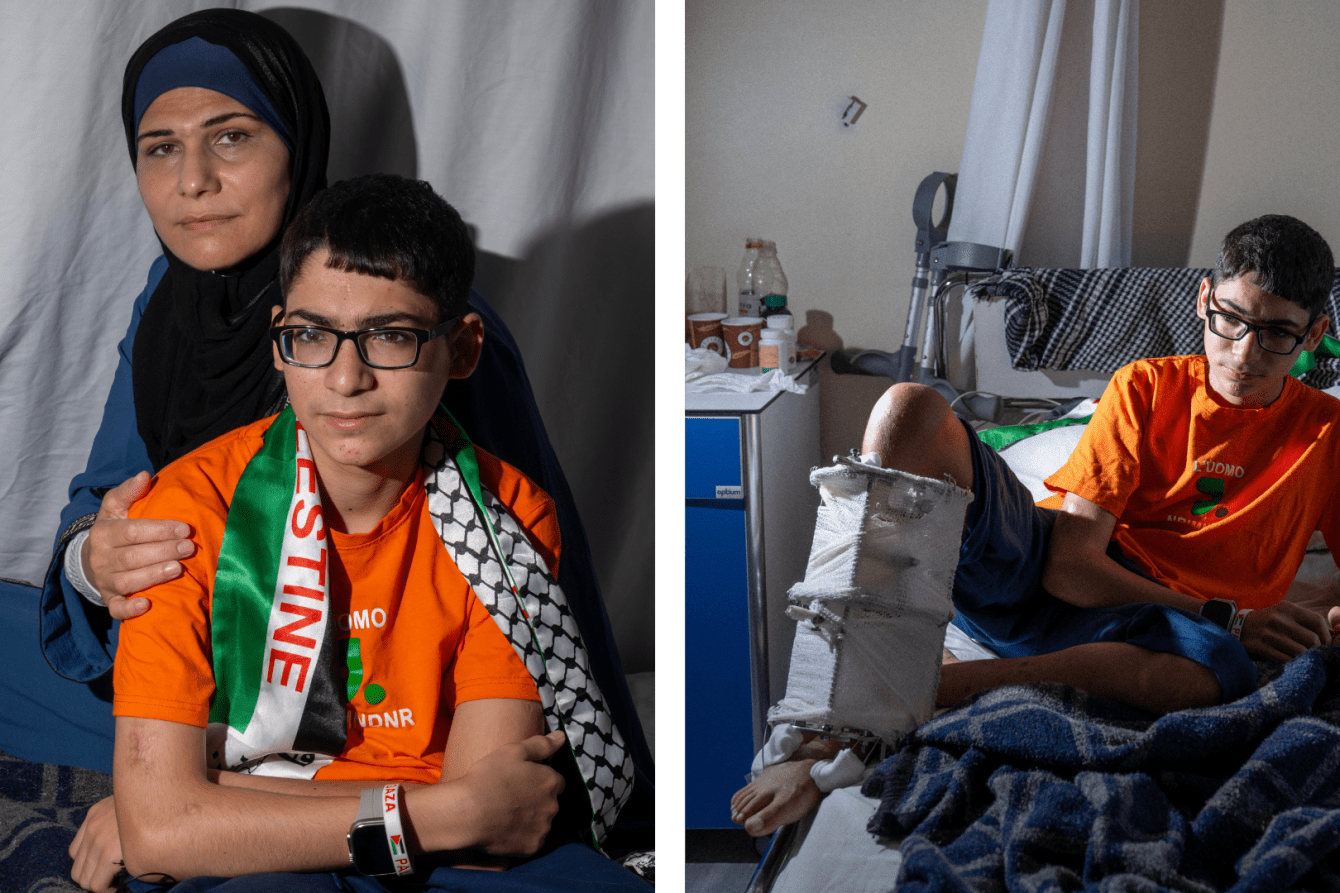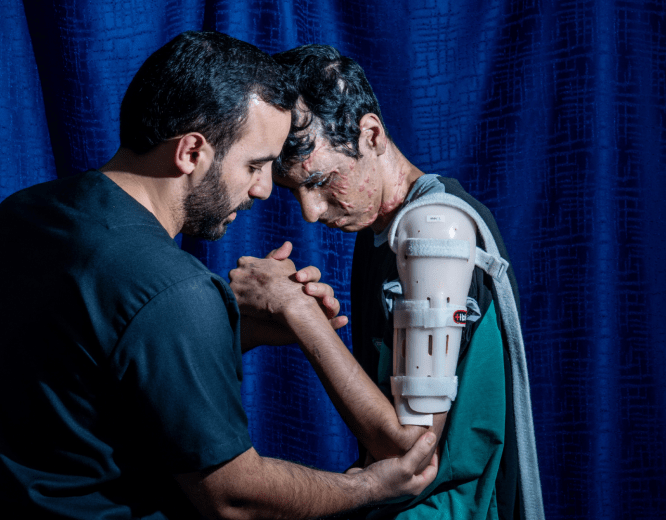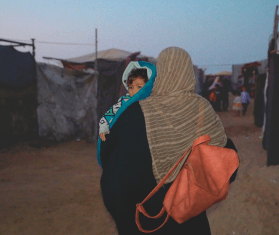Among the more than 95,000 Palestinians injured in the war in Gaza are thousands who require specialized care that is unavailable in the Strip, where the health system has been decimated by nearly a year of bombardment and siege. Yet the vast majority of medical evacuations requested have not been approved, according to the World Health Organization.
At the reconstructive surgery hospital Doctors Without Borders/Médecins Sans Frontières (MSF) runs in Amman, Jordan, our teams are treating the few Gazan children we have managed to transfer for rehabilitation after they were medically evacuated to Egypt—a tiny fragment of the thousands who remain trapped in Gaza.
One of our patients is Abdul Rahman, a 15-year-old boy who was critically injured when an Israeli airstrike targeted him and his friends in northern Gaza while they were out looking for food on February 10. Abdul Rahman nearly lost his leg in the attack. After receiving emergency surgery in Gaza, he was medically evacuated to Egypt and transferred to the MSF hospital in Amman, where he is undergoing comprehensive surgery along with daily physiotherapy and mental health support. Here, Abdul Rahman reflects on his incredible journey of recovery, while many other children like him remain in limbo as they await evacuation.

Abdul Rahman’s story
“My mom was asleep, so I went out with my backpack to try and sell sesame to get money for food with my cousin and a friend,” explains Abdul Rahman. “After a while, we went outside where the Israeli military had been, because often they leave food behind after they leave. I wanted to surprise my mom with some salt or flour.
“We were searching in some houses on Al-Rashid Street, next to the sea, when we saw that there were Israeli soldiers, so we started running away. I was in the middle and my cousin and friend were on either side of me. Then we heard the buzzing of a drone above us. Suddenly I felt like I was spinning and I couldn’t see anything. When I regained consciousness, my cousin was dragging me to the side of the road. He said, ‘If we stay here, we will all die.’ He tied something around my leg and then he ran away.
“I started crawling toward the sidewalk and I could still hear missiles dropping near me. I was crawling for about an hour. I remember there were dogs surrounding me. I kept screaming for help, and then fainting, until at some point a young man showed up. He picked me up and carried me on his shoulder. I remember he dropped me to rest, and then picked me back up again and continued walking. After a while, he put me on some wood, and with the help of other men they carried me all the way to the Jordanian hospital in Gaza.”

Fear of amputation without anesthesia
When Abdul Rahman arrived at the hospital, medics feared they would need to amputate his leg. He was transferred to the Baptist hospital, where surgeons performed emergency surgery and managed to save his leg. Due to the lack of medical supplies in Gaza, surgeons had to perform the operations without anesthesia.
“They would rub iodine inside the wound to stop it getting infected,” said Abdul Rahman, “it was torture. After three weeks, they transferred me to Al-Shifa Hospital, as the Israelis were dropping bombs near the Baptist hospital and it was no longer safe.
“We stayed at Al-Shifa for two months. There were massacres every day. However, when the Israelis raided the hospital in March we had to flee. There were no cars, so we had to travel to the south on donkeys. Whenever we saw Israelis they intimidated us, forcing us to raise our hands and get off the donkeys.”
Abdul Rahman was admitted to Yousef Al-Najar Hospital in Rafah, and after one week, he and his mother were granted permission for medical evacuation to a hospital in Cairo, Egypt, before being transferred to the MSF hospital in Amman a few months later. At the MSF hospital, Abdul Rahman has undergone surgery for to modify the external fixator on his right leg, as well as daily physiotherapy to encourage the healing of his bone.
“Before arriving here, I was only able to move with a wheelchair, but now I can walk with crutches,” said Abdul Rahman. “With the physiotherapy, I’m getting a bit better every day.
[...] When I get older, I hope to become a surgeon, because they have helped me a lot, so now I want to help other people.”

The long road to recovery for Gaza’s war-wounded children
MSF is treating medical evacuees from Gaza in Egypt and Jordan, but thousands who require specialized care are still trapped in the Strip.
Safeguarding the right to return to Gaza
While at least 12,000 people in Gaza are in need of medical evacuation, the case approval rate for medical evacuations is only 41 percent, according to the World Health Organization. Part of the obstacle in getting people with medical needs out of Gaza lies with the Israeli authorities, who are arbitrarily denying medical evacuations for children and their caretakers, according to MSF.
In addition to an immediate, sustained ceasefire, MSF is calling on authorities to facilitate medical evacuations without prejudice to Palestinians’ right to return, and for Israel to resume issuing medical referral permits for treatment in the West Bank and Jerusalem for severe cases that cannot be treated in Gaza. All medical referrals, patients, and their caregivers must be guaranteed safe, voluntary, and dignified return to Gaza.
“We want to go back to Gaza once it is rebuilt, but all of our buildings and homes have been destroyed,” said Abdul Rahman. “I just want to be reunited with my siblings and my father, who are still in Gaza. I always dream about them.”




